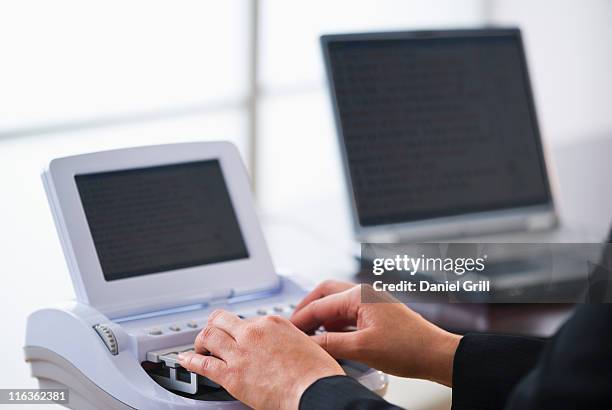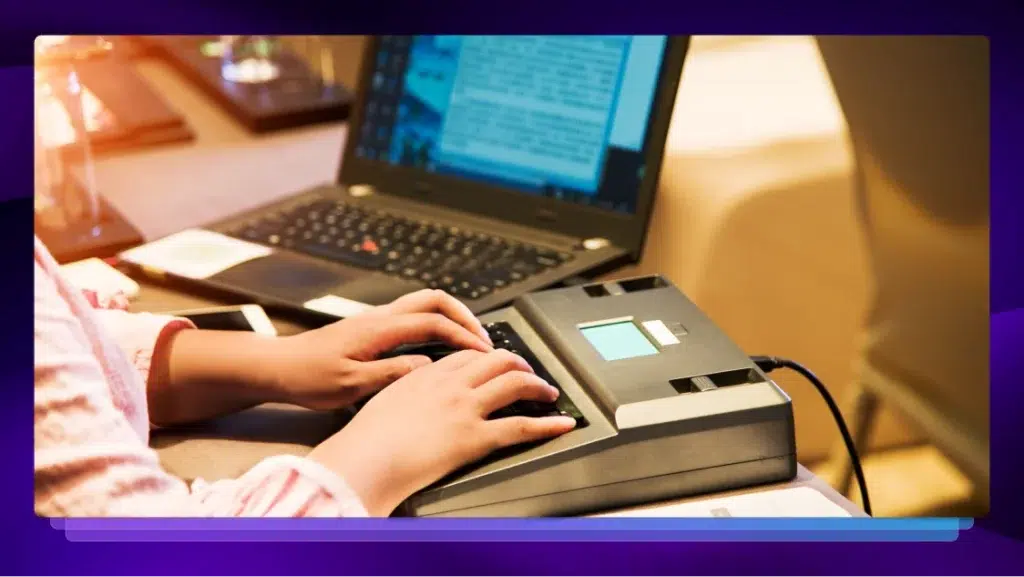How to Start a Career as a Professional Court Typist: Step-by-Step Guide
How to Start a Career as a Professional Court Typist: Step-by-Step Guide
Blog Article
Discover the Necessary Abilities and Obligations of a Court Typist in Today's Legal Landscape
As a court typist, you hold an essential position in the lawful system. Your skills exceed simply typing; they entail recognizing complicated legal terms and treatments while ensuring precision in every document. You collaborate carefully with judges and attorneys, making your duty indispensable for reliable interaction. However what certain skills do you require, and how can you adjust to the ever-evolving technological landscape? Allow's discover this additionally.
The Role of a Court Typist in the Judicial System
As the foundation of the judicial system, a court typist plays a crucial role in assuring that lawful proceedings are precisely recorded. You are accountable for transcribing whatever from witness testaments to judges' judgments, recording every detail with accuracy. Your job aids maintain a clear and irreversible document of court tasks, which is vital for future reference and appeals.In the courtroom, you're frequently the unhonored hero, silently guaranteeing that all spoken words end up being created records. You preserve discretion, recognizing the sensitive nature of lawful issues. You additionally collaborate carefully with lawyers, clerks, and judges to ensure the smooth circulation of details. By functioning successfully under stress, you add to the total effectiveness of the judicial process. Your interest to information and dedication to precision not only support the stability of the court however additionally support the broader pursuit of justice in culture.
Important Skills Needed for Court Typists
Court typists require an one-of-a-kind blend of skills to master their essential duty within the judicial system. Most importantly, you have to have excellent keying abilities, usually attaining speeds of 70 words per minute or even more. Precision is vital; even a small error can lead to substantial misunderstandings in legal records. You'll likewise need solid attention to information, making sure every word is transcribed correctly.Additionally, excellent business skills are vital for managing multiple instances and records successfully. Being tech-savvy is necessary, as you'll use various software programs for data processing and paper management. Solid communication abilities assist you connect with judges, legal representatives, and other court employees effectively.Lastly, a sense of expertise and privacy is a must, as you'll take care of sensitive info daily. By sharpening these skills, you'll be well-prepared to contribute substantially to the courtroom environment.
Comprehending Lawful Terminology and Procedures
As a court typist, you need to realize key legal terms and treatments to perform your job effectively. Comprehending these principles not just helps you record properly but additionally assures you can follow the flow of court procedures. Let's check out the essential legal vocabulary and a review of court procedures you should know.

Key Legal Terms
Comprehending key legal terms is essential for any person operating in a court room atmosphere. You'll frequently experience terms like "plaintiff," which describes the individual starting a lawsuit, and "defendant," that replies to the accusations. Understanding the difference between "civil" and "criminal" cases aids you grasp the context of the proceedings. Knowledge with "subpoena" warranties you recognize the lawful papers compelling witnesses to affirm. Additionally, terms like "proof" and "testament" are vital, as they relate straight to the info presented in court. Mastering these terms not just enhances your performance as a court typist but also guarantees that you add to the precision and clearness of legal documents. Your duty pivots on accurate terminology, so do not take it lightly!
Court Procedures Overview
Knowledge with essential lawful terms establishes the stage for comprehending court procedures. Recognizing how a court room features is crucial for any court typist. You'll encounter procedures like arraignments, where defendants listen to fees, and movements, which are ask for a court judgment. Familiarize on your own with the functions of clerks, lawyers, and courts, as each plays a crucial component in process. Knowing the flow of a trial-- from court option to shutting arguments-- assists you properly record the proceedings - court typist. Furthermore, understanding the value of keeping a neutral and accurate document can't be overstated. By grasping these aspects, you'll boost your performance in recording necessary court tasks and add substantially to the lawful procedure. Your duty is crucial in preserving the stability of court documents
The Impact of Technology on Court Typing
Technology's changed court inputting in substantial ways. With electronic transcription devices, you can raise performance and accuracy, making your work less complicated than ever before. Plus, remote court proceedings have actually altered how you approach your work, calling for versatility to new layouts and modern technologies.
Digital Transcription Tools
As digital transcription devices proceed to develop, they're changing the method court typists perform their duties. These devices improve the transcription procedure, enabling you to capture talked words precisely and efficiently. With voice acknowledgment software application, you can transcribe real-time process, reducing hand-operated input and lessening errors.Moreover, cloud-based platforms allow easy accessibility to files, so you can function collaboratively with legal groups and guarantee every person's on the exact same web page. Automated formatting functions save you time on recurring tasks, allowing you concentrate on content quality.Additionally, electronic tools boost safety, safeguarding delicate info through encrypted storage space and regulated access. By accepting these technologies, you can enhance your performance and preserve the high standards called for in the legal area.
Remote Court Process
The increase of remote court proceedings has significantly altered the landscape for court typists. You currently count on innovation to record and record live hearings from your home or office. Knowledge with video conferencing platforms is necessary, as you'll require to browse them perfectly to ensure a precise document. You'll additionally have to manage audio high quality, as background sound or link concerns can interrupt your job. Additionally, remote proceedings require fast reasoning; you may need to clarify statements or request repeats in real-time. Staying organized and efficient is vital, as due dates continue to be limited. Welcoming these technical advancements not only enhances your abilities yet additionally assures you continue to be an important asset in today's progressing legal atmosphere.
Accuracy and Interest to Information in Transcription
Precision and interest to detail are crucial in transcription, particularly for court typists. court typist. When you're transcribing legal procedures, every word matters. A single blunder can modify the meaning of a statement, potentially impacting the outcome of a situation. You need to pay attention thoroughly, guaranteeing that you catch every subtlety and inflection in the speaker's voice.Your capacity to catch typos and grammatical mistakes is necessary. You do not just type; you confirm that the last paper is a specific depiction of what was said in court. This calls for a keen eye and an extensive understanding of legal terminology.Moreover, you'll require to be acquainted with various accents and speaking designs, as courts can hold a selection of speakers. By sharpening your click here for more info precision and attention to information, you'll preserve the honesty of legal documents and add substantially to the judicial process. Your diligence in this location genuinely makes a distinction

Time Management and Organizational Skills
While managing numerous jobs, effective time monitoring and business abilities are essential for court typists. You'll typically juggle different target dates, from recording court proceedings to preparing legal documents. Prioritizing your workload is crucial; determine urgent jobs and tackle them first to assure prompt submissions.Organizational skills enter into play when you're arranging with instance records, data, and notes. Keeping every little thing neatly categorized not only saves time however likewise minimizes the danger of error. Using devices like schedules, order of business, or specialized software can assist you remain on track and handle your time effectively.Moreover, establishing particular objectives for each job session can increase your efficiency. Damage larger tasks into smaller sized tasks to make them extra workable. By refining these skills, you'll not only enhance your performance however likewise contribute considerably to the smooth operation of the lawful procedure, guaranteeing every little thing runs like clockwork.
Continuing Education And Learning and Specialist Growth Opportunities
Purchasing your abilities does not stop with time monitoring and organization. As a court typist, you'll find that continuing education and learning and specialist development are vital to remaining affordable in the legal field. Try to find workshops or online programs concentrating on advanced inputting strategies, legal terminology, and transcription software application. These can sharpen your abilities and assist you adapt to the most current technologies.Networking is similarly vital. Join expert companies like the National Court Reporters Organization (NCRA) or local legal associations. They typically use resources, training sessions, and meetings that can enhance your knowledge and connect you why not check here with peers.Don' t neglect regarding certification programs that can boost your reliability and bankability. Staying updated with the most current patterns and finest techniques in lawful documents will enhance your effectiveness and precision, making you an invaluable asset to any kind of legal team. Purchase your growth, and you'll enjoy the benefits throughout your job.
Frequently Asked Inquiries
What Is the Regular Salary Variety for a Court Typist?
A court typist's common income ranges from $30,000 to $55,000 each year, depending upon experience and area. You may additionally find possibilities for development with extra skills, bring about raised pay in the legal field.

Are Court Typists Required to Have a Legal Degree?
Court typists don't require a lawful level, yet having one can be beneficial. You'll typically discover that solid typing skills and knowledge of legal terminology are more essential for success in this function.
What Are the Work Hours for a Court Typist?

Exactly How Do Court Typists Guarantee Discretion in Their Job?
You assure privacy by firmly managing sensitive records, making use of encrypted software program, and adhering to stringent protocols. You remain familiar with personal privacy regulations and only share details with licensed personnel, keeping count on the judicial procedure.
Can Court Typists Job From Another Location or Freelance?
Yes, you can work from another location or freelance as a court typist, particularly if you have trustworthy modern technology and a safe environment. Several legal professionals currently welcome remote work, offering adaptability and possibilities for independent why not try here typists. As the foundation of the judicial system, a court typist plays a necessary function in guaranteeing that lawful procedures are accurately recorded. As a court typist, you need to understand key lawful terms and procedures to execute your task efficiently. Mastering these terms not just improves your performance as a court typist however also ensures that you contribute to the precision and quality of legal documents. The increase of remote court proceedings has actually substantially altered the landscape for court typists. As a court typist, you'll find that proceeding education and learning and professional advancement are essential to remaining affordable in the legal area.
Report this page